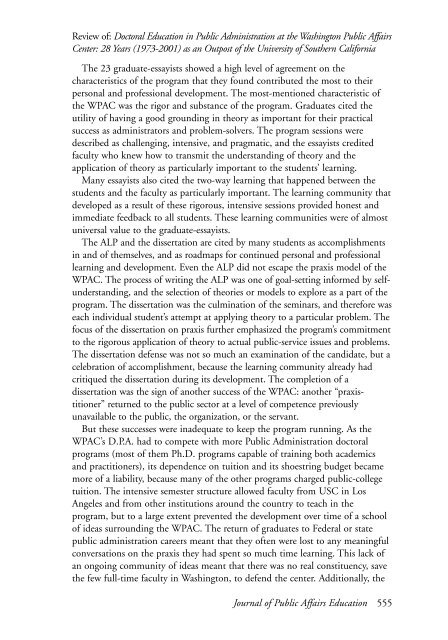JOURNAL OF PUBLIC AFFAIRS EDUCATION - National ...
JOURNAL OF PUBLIC AFFAIRS EDUCATION - National ...
JOURNAL OF PUBLIC AFFAIRS EDUCATION - National ...
You also want an ePaper? Increase the reach of your titles
YUMPU automatically turns print PDFs into web optimized ePapers that Google loves.
Review of: Doctoral Education in Public Administration at the Washington Public Affairs<br />
Center: 28 Years (1973-2001) as an Outpost of the University of Southern California<br />
The 23 graduate-essayists showed a high level of agreement on the<br />
characteristics of the program that they found contributed the most to their<br />
personal and professional development. The most-mentioned characteristic of<br />
the WPAC was the rigor and substance of the program. Graduates cited the<br />
utility of having a good grounding in theory as important for their practical<br />
success as administrators and problem-solvers. The program sessions were<br />
described as challenging, intensive, and pragmatic, and the essayists credited<br />
faculty who knew how to transmit the understanding of theory and the<br />
application of theory as particularly important to the students’ learning.<br />
Many essayists also cited the two-way learning that happened between the<br />
students and the faculty as particularly important. The learning community that<br />
developed as a result of these rigorous, intensive sessions provided honest and<br />
immediate feedback to all students. These learning communities were of almost<br />
universal value to the graduate-essayists.<br />
The ALP and the dissertation are cited by many students as accomplishments<br />
in and of themselves, and as roadmaps for continued personal and professional<br />
learning and development. Even the ALP did not escape the praxis model of the<br />
WPAC. The process of writing the ALP was one of goal-setting informed by selfunderstanding,<br />
and the selection of theories or models to explore as a part of the<br />
program. The dissertation was the culmination of the seminars, and therefore was<br />
each individual student’s attempt at applying theory to a particular problem. The<br />
focus of the dissertation on praxis further emphasized the program’s commitment<br />
to the rigorous application of theory to actual public-service issues and problems.<br />
The dissertation defense was not so much an examination of the candidate, but a<br />
celebration of accomplishment, because the learning community already had<br />
critiqued the dissertation during its development. The completion of a<br />
dissertation was the sign of another success of the WPAC: another “praxistitioner”<br />
returned to the public sector at a level of competence previously<br />
unavailable to the public, the organization, or the servant.<br />
But these successes were inadequate to keep the program running. As the<br />
WPAC’s D.P.A. had to compete with more Public Administration doctoral<br />
programs (most of them Ph.D. programs capable of training both academics<br />
and practitioners), its dependence on tuition and its shoestring budget became<br />
more of a liability, because many of the other programs charged public-college<br />
tuition. The intensive semester structure allowed faculty from USC in Los<br />
Angeles and from other institutions around the country to teach in the<br />
program, but to a large extent prevented the development over time of a school<br />
of ideas surrounding the WPAC. The return of graduates to Federal or state<br />
public administration careers meant that they often were lost to any meaningful<br />
conversations on the praxis they had spent so much time learning. This lack of<br />
an ongoing community of ideas meant that there was no real constituency, save<br />
the few full-time faculty in Washington, to defend the center. Additionally, the<br />
Journal of Public Affairs Education 555

















